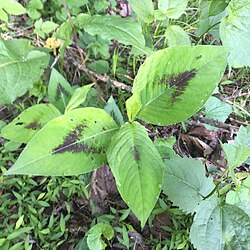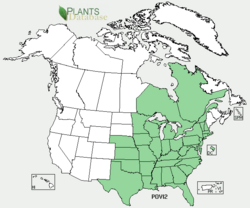Biology:Persicaria virginiana
| Persicaria virginiana | |
|---|---|

| |
| Scientific classification | |
| Kingdom: | Plantae |
| Clade: | Tracheophytes |
| Clade: | Angiosperms |
| Clade: | Eudicots |
| Order: | Caryophyllales |
| Family: | Polygonaceae |
| Genus: | Persicaria |
| Species: | P. virginiana
|
| Binomial name | |
| Persicaria virginiana (L.) Gaertn.
| |

| |
| Range within North America | |
| Synonyms[1] | |
Persicaria virginiana, also called jumpseed,[2] Virginia knotweed or woodland knotweed[3] is a North American species of smartweed within the buckwheat family. It is unusual as a shade-tolerant member of a mostly sun-loving genus. Jumpseed is a perennial, named for its seeds which can "jump" several feet when a ripe seedpod is disturbed.
Persicaria virginiana blooms in midsummer to late summer/early fall. It has a stalk of small white flowers.[4]
Description
Like other Persicaria, jumpseed has alternate leaves, with fine-hairy stipular sheaths (ocrea) with bristle-fringed edges which often turn brownish. Flowers, widely spaced along slender stalks, are white to greenish-white, rarely pink-tinged, and fruiting flowers have 2 downward-pointing hook-tipped styles.[3] Persicaria virginiana is easily distinguished from most other Persicaria species by its much larger, more oval-shaped leaves, although a few species also have large leaves. It sometimes has a chevron-shaped marking on the leaves; often a single plant will have this marking on some leaves but not others.
Cultivars and naturalized populations from cultivation show much greater variation than wild-type plants, sometimes having variegation or have more involved red patterning, and sometimes having red or pink flowers.
Distribution and habitat
Persicaria virginiana has a wide native range throughout most of eastern North America (from Ontario and Quebec, south to Florida, and west as far as Texas, Nebraska, and Minnesota/),[2][5][6] as well as Japan and the Himalayas.[7][8]
It naturally occurs in full to partial shade, on riverbanks, woods, cliffs, and rocks.[9]
Cultivation
Many variegated cultivars exist including 'Variegata' and 'Painter's Palette'.[8] The cultivated plant prefers medium to moist soil and full sun to part shade.[10]
References
- ↑ "Persicaria virginiana (L.) Gaertn.", Tropicos, Missouri Botanical Garden, http://www.tropicos.org/Name/50080897?projectid=0
- ↑ 2.0 2.1 "Persicaria virginiana". Natural Resources Conservation Service PLANTS Database. USDA. https://plants.usda.gov/core/profile?symbol=POVI2. Retrieved 12 October 2015.
- ↑ 3.0 3.1 David M., Brandenburg (2010). National Wildlife Federation Field Guide to Wildflowers of North America. New York: Sterling Publishing. p. 432. ISBN 978-1402741548.
- ↑ Hinds, Harold R.; Freeman, Craig C. (2005), "Persicaria virginiana", in Flora of North America Editorial Committee, Flora of North America North of Mexico (FNA), 5, New York and Oxford, http://www.efloras.org/florataxon.aspx?flora_id=1&taxon_id=250060702
- ↑ "Persicaria virginiana", County-level distribution map from the North American Plant Atlas (NAPA) (Biota of North America Program (BONAP)), 2014, http://bonap.net/MapGallery/County/Persicaria%20virginiana.png
- ↑ "Map Key". 2011-02-18. http://www.bonap.org/MapKey.html.
- ↑ "Persicaria virginiana". http://www.missouribotanicalgarden.org/PlantFinder/PlantFinderDetails.aspx?taxonid=291626.
- ↑ 8.0 8.1 Barbara W. Ellis. Covering Ground: Unexpected Ideas for Landscaping with Colorful, Low-Maintenance Ground Covers. Storey Publishing, 2012. p. 154. ISBN:9781612122168
- ↑ "Persicaria virginiana". University of Wisconsin–Stevens Point, Robert W. Freckmann Herbarium. http://wisplants.uwsp.edu/scripts/detail.asp?SpCode=POLVIR.
- ↑ "Persicaria virginiana (Variegata Group)". Missouri Botanical Garden. http://www.missouribotanicalgarden.org/PlantFinder/PlantFinderDetails.aspx?kempercode=w360.
External links
- "Persicaria virginiana - Species Details". 2015-08-14. http://florida.plantatlas.usf.edu/plant.aspx?id=866.
- photo of herbarium specimen at Missouri Botanical Garden, collected in Missouri in 2014
Wikidata ☰ Q5371639 entry
 |


